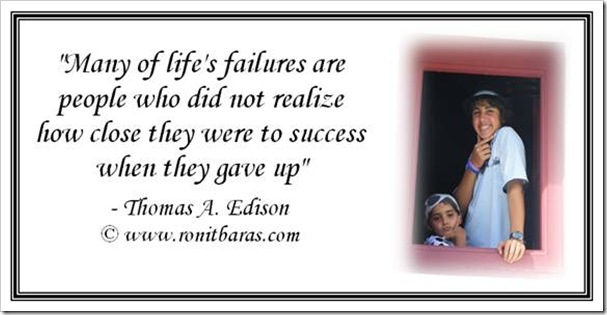
Courage is not the absence of fear, but rather the judgment that something else is more important than fear
– Ambrose Redmoon
Fear is the source of all the troubles in life. People fear many things. Some seem logical and others do not, but all of them produce chemicals in the body that make us feel unhappy. Much like any other negative feeling, fear fits on a scale that starts with feeling a bit of discomfort, goes through increasing the heart beat and ends with having a huge panic attack.
The path to success at anything in life passes through many fears. The most famous fear is the fear of failure, which develops as we become socially aware. We learn through our socialization process what the standards are and much of our life is dedicated to meeting those standards. The fear of failure is the fear that we will not “make the grade” and will not be accepted socially.
I have written a lot about the fear of failure (see Angels of love and demons of fear), but I think many people are not aware this fear has a twin brother – the fear of success.
Many people confuse the two. Just like twins who show many similarities on the surface but have different identities inside, the fear of failure and the fear of success are in fact different.
Fear of failure will make you try to fit into a standard (usually external), but fear of success will make you do anything to avoid reaching that standard.
While fear of failure is out there and everybody knows about it, fear of success is hidden so deep in our identity we may not recognize it, but it can be much worse for us.
Fear of failure is associated with making mistakes and not getting approval, while fear of success is the fear of doing things right and therefore not being accepted, not being appreciated and not being able to maintain the level of achievement and success.

While fear of failure results in avoidance, fear of success results in self-sabotage. People with a fear of failure try to avoid the pain of failure. They do not do anything that might lead them to failure. This behavior looks like lack of motivation. People with fear of success are also perceived as lacking motivation and if they do achieve success, they quickly mess it up. This way, their unsuccessful identity can be maintained. They tell stories of “almost success”, of self destructive behavior immediately after major success, like “Just when he had enough money, he blew it” or “Just when they bought a new house, he lost his job”.
In 1915, Sigmund Freud wrote an article called “Those Wrecked by Success”. He described a tendency to fail “precisely when a deeply rooted and long-cherished wish has come to fulfillment … as though they were not able to tolerate happiness”.
Sounds funny?
Well, it is not!
Freud described the fear of success as a perceived need to fail, not an option or a desire but a need. Some people develop the identity of a failure and in order to maintain it, they consciously or subconsciously (I do not think they have agreed on which one and I am sure it is a mixture of the two) sabotage everything that could prevent them from fulfilling this self-image.

Freud connected most things to sex and child/parent relationships during childhood. In his view, it all starts as a competition between the child and the parent of the opposite sex. Because not all people develop this tendency, having a parent from the other sex cannot stand alone as a reason (I think Freud was so pre-occupied with sex and parents of the opposite sex that everything he believed was derived from it). I believe that because the fear of success exists at the identity level, the source of the problem is not only the parents but all the main identity agents – parents, teachers, other family members and, later on in life, peers.
Another theory related to fear of success is the Imposter Syndrome. This is when people develop a belief that their success is not real and they live in fear others will discover they are not “really” good at what they do and they are only pretending to be successful. These people distinguish between “fake success” and “real success”.
Fear of success affects life in many ways and the component of self-sabotage makes life a daunting experience. The problem is that it is very hard to blame others for bad luck, so the fearers come up with many excuses to explain their unsuccessful circumstances.

Self-awareness is always the key to overcoming the fear of success. Unfortunately (or maybe fortunately), we are the only people who can access our deepest beliefs and uproot them. Although this process may take time, it is very important in order to have a successful, loving, healthy, wealthy, friendly, funny, interesting, fascinating, fulfilling and happy life.
As I said before, the source of the fear is beliefs we have regarding ourselves and others that produce a sabotaging reaction. Finding the beliefs or behaviors associated with the fears is a good start to overcoming them.
Below are statements and behaviors of people with fear of success. Read them and mark the ones you think you have. Rate each of your beliefs between 1 and 10 – 1 being weak and 10 being very strong. The stronger the belief is, the stronger the identity of failure and the more you will sabotage your own success. If you decide to change anything, monitor your progress every month using the list and see if your beliefs have weakened.

- “Talking about my success is showing off” – The underlying belief is that success brings “Too much attention”, which then creates jealousy in others. People who hold this belief do not distinguish between being proud and boasting.
- “I feel guilty when I succeed” – This statement is based on a distorted definition of fairness that links my gain to others’ loss.
- “When I succeed, others will have high expectations of me”
- “It’s lonely at the top” or “Successful people are very lonely” – These beliefs were invented by people who want to excuse their lack of achieving and they are very much associated with culture and upbringing.
- Minimize successes (“It was no big deal”)
- Treat success as a fluke or luck (“I was just lucky”), as if success has nothing to do with doing something.
- “Success is hard work” – this is the ultimate way to resent success. Who on earth wants to succeed if it is such hard work?
- “Getting to the top is easy but staying there is hard” or “Falling from higher up hurt more” – makes the top undesirable.
- “What’s so special about me” syndrome – Using statements like “Anyone could have done it”, self talk of “Who do you think you are?”, self doubt of “Why do you think you deserve it more than others?”
- Find it hard to accept compliments – This is very much connected to minimizing success.
- “The bar is too high for me” – whenever discussing success, describing it as an unreachable target.
- Pessimism – Telling stories and excuses why it better not to succeed and why success never lasts and picking up stories of successful people’s failures and faults everywhere.
- “Life is not about what you want” – This is a belief that sees wanting as illegitimate.
- High dependency on others, supporting the conviction “I am unable to succeed on my own”.
- The “Imposter Syndrome” – Fear of cheating, dishonesty, “What if they find out I can’t really do that?”, “What if they find out I’m not that smart?”
- “My private life will suffer” – Again, too much attention will create a problem. Fear of exposure (connected to the imposter’s syndrome).
- “It could be worse” – Comparing to others having less to make the lack of success not seem so bad.
- Setting unrealistic goals to prove to themselves they cannot achieve. Dedication to quick fixes. When it does not happening quickly, this is proof it will never happen.
- Adopt the “overnight success” theory to support the belief that success is all about luck and give self permission to miss opportunities.
- Constant search for certainty as a subconscious reason not to move forward. “How can I guarantee my luck will stay with me?”, “I don’t have proof that I will earn that much next year”, “I could be run over by a truck until then”. Fear that good will not continue.
- “Success will limit me” – Success will put more demands on your time, your choices. You fear people will perceive you in one way and you will not be able to be or do anything else. “Wealthy people can’t sleep at night, because they worry all the time”, “If I become famous for my cooking, I must cook a restaurant-level meal every time I have guests. It is too demanding”. Notice no one demands this but you!
- Debating a decision and procrastinating for a long time with the unconscious belief that circumstances will make the choice for you, while you go on missing opportunities. “I saved up money, but by the time I got to the shop, they had sold what I wanted “.
- Patterns of accidents and being unlucky – Everyone has accidents. The real worry starts when you recognize you have too many accidents or that you wonder, “Why does this always happen to me?”
- “I need to keep doing well. One mistake and they will find someone better than me” – this is the fear of not being able to maintain success.
- “I’m not good enough – I don’t deserve to feel good, be appreciated, have more and succeed” – This reflects low self esteem (self worth) at the identity level and is also a part of the imposter syndrome.
- Perfectionism (all or nothing mentality) – “If I can’t do it perfectly, it’s not worth even starting”. Planning forever, trying to plan for every little detail and not executing.
- “Others are so much better than me” – There will always be people better than you, but you can still succeed. This is a comparative version of perfectionism that says, “If I can’t be the best, it’s not worth even starting”.
- “It’s easy for others” – “It’s so easy for them to learn this, while I need to sit for hours to study”.
- Fear of emptiness when goals are reached. “If I reach what I want, there will be nothing left to aim for”, “Reaching my goals easily will kill my motivation”. This is the belief that success = the end.
- “People who get things easily don’t appreciate them” – Do babies appreciate their mother’s milk? How hard do they work for it? On the other hand, they work really hard to walk, but do they appreciate that ability every day after it becomes automatic?
- “It will not make me happy” – People with the fear of success have an unrealistic and hard to find definition of The ultimate happiness. They are convinced they will never get there. This ultimate definition does not exist and the search for it is sometimes an excuse to not achieving any success.
- “I will have to start all over again” – Fear of changes and of new things or new opportunities.
- Having the “too late” mentality – “I’m not young anymore”, “I didn’t do it when I could and now it’s impossible”.
- “I work better under pressure” – This belief supports self sabotaging behavior and explains many peoples’ failed attempts in life with the excuse “I was very stressed”.
- “It’s human to make mistakes” – Well, it is human to make mistakes, but if you say this too often, it means you do not find the correlation between your actions and your mistakes. It is human to make mistakes, but making bad choices repeatedly can be avoided. There is a difference between saying the wrong thing occasionally and going through a series of bad relationships with the same type of person.
- “Is it worth it?” – This is a problem with the definition of “worth”. It puts distance between the effort and the reward.
- “I’ve never succeeded, so how would I know when I get there?” – This is a very deeply-rooted self-image problem of finding it hard to get out of the comfort zone, even if the comfort zone means not succeeding.
I have read many self assessments in my life and many personal development quizzes. They say that if you have between 10 and 20 bad beliefs, you have a chance of experiencing success, if you have between 20 and 30, your chance of succeeding is very small, and if you have more than 30, you will never succeed.
That is not true! No matter how many negative beliefs you have now, you can still succeed, because beliefs can be changed!
This is how I would read the results: Even if you have 1 negative belief about success – change that belief!
Why?
Because fear and success cannot live together in peace in the same body. The more fear you have, the less success you have and vice versa, so the more empowering beliefs you have about success, the more successful you will be.

How to overcome your fear of success
- Make a list of your proud moments
- Make a list of your talents and things you like about yourself
- When you hear yourself trying to explain a failure, stop yourself. Only elaborate on your successes
- Look for patterns in your life. Sit down and write your biography. You can take 3 hours, 3 days or 3 months to do it, but this writing will help you recognize patterns and narrow down what you want to focus on.
- Learn to accept compliments
- Give compliments to others. The more you give, the more you receive and the cycle will help you listen to good things about yourself. Hearing a lot of compliments about you will convince your subconscious they are true.
- Set goals and work towards them. Feel The Fear And Do It Anyway!
- Reward yourself for successes – a day off, a massage, a bubble bath, a romantic dinner or even 5 quiet minutes in the sun or a smile at your reflection in the mirror
- Collect success stories of successful people who have lots of friends
- Collect success stories of successful people who are generous
- Collect success stories of successful people who are healthy and fit
- Imagine a successful future. Dream!

- Remove “luck” from your vocabulary. If you ask any successful person, nothing has anything to do with luck. Yes, for some successful people there was a sudden change in their success, but it never happened when they were just sitting and waiting for it.
- Make a list of what makes you special and adopt the “Be Special, Be Yourself” attitude and it will help you overcome the “imposter syndrome”
- Work on your personal development. If you find it hard to do it all by yourself, hire a life coach – this is what they do, they teach you the art of successful living

The past month has been very full with many new projects starting. Another one is about to end – my parenting workshop in Brisbane Australia on Sunday the 25th of July. I know they will be successes. What about you?
Happy days,
Ronit












